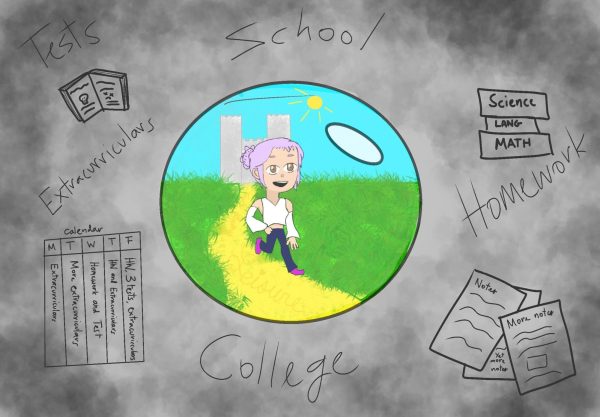The Denome’s Advocate: Fake news
A non-satirical column
My column is normally a satirical look at what has happened on the domestic front over the last month. Rather than focus on the negative aspects of the American political system, I instead try to find a way to poke fun at the issues plaguing the country and offer a younger, more progressive perspective on politics while attempting to remain humorous and lighthearted.
However, like any other person with an interest in bettering the country, there are certain issues that I find to be no laughing matter. As a student journalist, someone whose job is to keep the student body of HHS, informed, one of the topics I personally cannot find or make funny is fake news and the spread of it.
Fake news has slowly turned from being an actual joke, with humor sites such as The Onion using it as a satirical tool, to a real threat to the integrity of American politics and how the media is viewed by the public. Over the past year, synonymous with the rise of Donald Trump and the alt-right, we have seen fake news become a hot-button issue in the world of media.
These false stories, spread through social media and mass news-distribution platforms have continued to influence American politics even after the presidential election, where honesty in the media took center stage.
The most prominent of these platforms, Facebook, which is used by 44 percent of Americans to find news, according to Pew Research Center, has come under fire for allowing fake news to navigate the internet unchecked. Facebook has since adjusted its rules regarding the reporting of misinformation.
While this fake news may seem harmless to many experienced politicos who have learned to differentiate between trusted sources and rambling pundits, American politics has become increasingly less based on facts and more based on whatever the person in question perceives to be right. It has become an increasingly common insult from both liberals and conservatives that the other side ignores reality or “lives in their own special world.”
With politics becoming much more based on feelings over facts, this provides a perfect opportunity for false news stories to take a foothold. As facts have become less important to the American public, stories with vague details or untrue evidence can strongly influence a large portion of the population.
This isn’t just me, a high school newspaper columnist, speculating. It is becoming increasingly common to see stories of rabid Trump supporters sending death threats or ridiculously overreacting to news that is too fantastical to be true. Take the North Carolina man who brought an assault rifle into a pizza parlor to investigate a supposed child sex ring he read about on a fake news website late last year.
What’s most scary is that news stories like the aforementioned pizza parlor sex ring rumor is that stories like these may have played a hand in deciding the presidential election. A fake news story about the Hillary Clinton campaign paying anti-Trump protesters following the latter’s surprise victory was shared on Facebook over 350,000 times, according to the New York Times. Another scam article before the election, claiming Pope Francis had endorsed Trump, received 100,000 shares on Facebook, according to the Washington Post.
The latter alone could have swung the election. Unlikely as it is, if 40,000 people in Pennsylvania, 20,000 people in Wisconsin and 10,000 people in Michigan voted for Trump over Clinton because of that one fake article, we would have inagurated the country’s first female president instead of Trump. The fact that there is even the tiniest chance that fake news could have affected the results of the election is completely unacceptable.
Again, these incidents are not isolated. We are seeing headlines, such as a fake CNN reporting a ban on the national anthem or a hoax ABC pulling an endorsement of Trump by the American Amish Brotherhood out of thin air, being passed as truth, by people who either genuinely believe these lies or who willingly allow misinformation to spread. Whichever one it is, this is a crisis, one at which I, or any self-respecting journalist, cannot and should not stand by and watch happen.
It has been several months since the presidential election and in that time, Trump has not only continued to push the status quo that he began in his secretive campaign, but also embraced this movement away from truth and towards the choose-your-own-reality political scene that the fake news boom has begun. We have seen Trump continue to dodge questions on how he will handle his numerous conflicting business interests while in the White House and avoiding releasing his tax returns. We are not seeing an administration for the people, like Trump’s populist campaign had promised.
Instead, America is becoming an easier place to be dishonest in. Our president is setting an example of what American politics is turning into. Secrecy and a blatant disregard for policy and truth. This is not the direction our country needs to follow.
Rather than succumb to four years of distaste and distrust, it’s time we push even harder. America deserves to know about Trump’s finances and business, just as much as we deserve accurate and truthful news coverage from reputable media organizations, not from fake websites and unobserved corners of social media.
Journalists from every state, county and city should take pride in the work that we must do going forwards. It’s the media’s job to report the truth and let the public know what is happening in our government office buildings. Considering the American political environment now, the public is going to need that more than ever.










